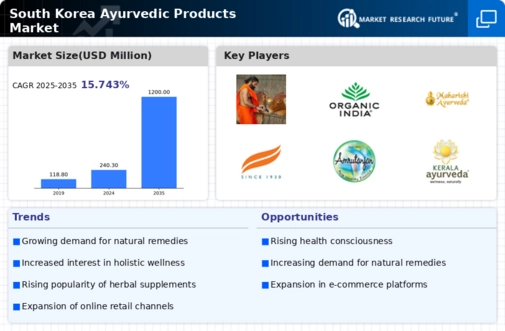Increased Online Retailing
The rise of e-commerce platforms is transforming the ayurvedic products market in South Korea. With the convenience of online shopping, consumers are increasingly turning to digital channels to purchase ayurvedic products. Data suggests that online sales of health and wellness products have surged by 30% in the past year, indicating a shift in consumer behavior. This trend is particularly pronounced among younger demographics, who favor the accessibility and variety offered by online retailers. The proliferation of social media and influencer marketing also plays a crucial role in promoting ayurvedic products, as consumers are more likely to trust recommendations from online personalities. As a result, the ayurvedic products market is likely to benefit from enhanced visibility and reach, potentially leading to increased sales and market penetration.
Growing Health Consciousness
The ayurvedic products market in South Korea is surging due to increasing health consciousness among consumers. As individuals become more aware of the benefits of natural and holistic health solutions, the demand for ayurvedic products is likely to rise. Recent surveys indicate that approximately 65% of South Koreans prefer natural remedies over synthetic alternatives, which significantly influences purchasing decisions. This shift towards preventive healthcare and wellness is propelling the ayurvedic products market forward. Furthermore, the market is projected to grow at a CAGR of 12% over the next five years, reflecting a robust interest in traditional health practices. The growing inclination towards self-care and wellness is expected to further enhance the appeal of ayurvedic products, making them a preferred choice for health-conscious consumers.
Expansion of Product Offerings
The ayurvedic products market is witnessing an expansion of product offerings, catering to diverse consumer needs and preferences. Companies are increasingly diversifying their portfolios to include a wide range of ayurvedic products, from herbal supplements to skincare items. This diversification is driven by consumer demand for personalized health solutions and the desire for holistic wellness. Recent market analysis indicates that the skincare segment within the ayurvedic products market is expected to grow by 15% annually, reflecting a growing interest in natural beauty products. Additionally, the introduction of innovative formulations and product lines is likely to attract a broader audience, including younger consumers. As the market continues to evolve, the expansion of product offerings may play a crucial role in enhancing competitiveness and driving growth within the ayurvedic products market.
Rising Interest in Sustainable Products
Sustainability is becoming a pivotal factor influencing consumer choices in the ayurvedic products market. South Korean consumers are increasingly prioritizing eco-friendly and ethically sourced products, which aligns with the core values of Ayurveda. The demand for sustainable packaging and organic ingredients is on the rise, with approximately 55% of consumers willing to pay a premium for environmentally friendly products. This trend is likely to drive innovation within the ayurvedic products market, as companies strive to meet the expectations of environmentally conscious consumers. Furthermore, the emphasis on sustainability may enhance brand loyalty, as consumers are more inclined to support brands that align with their values. As the market evolves, the integration of sustainable practices could become a key differentiator for companies operating in the ayurvedic products market.
Cultural Acceptance of Traditional Medicine
The ayurvedic products market in South Korea is bolstered by the cultural acceptance of traditional medicine. South Koreans have a long-standing appreciation for herbal remedies and natural treatments, which aligns well with the principles of Ayurveda. This cultural affinity is reflected in the growing number of consumers seeking out ayurvedic products as part of their health regimen. Recent studies indicate that around 40% of the population regularly uses herbal supplements, showcasing a strong market for ayurvedic offerings. Additionally, the integration of ayurvedic principles into mainstream wellness practices is likely to further enhance the market's growth. As consumers increasingly seek holistic approaches to health, the ayurvedic products market stands to gain from this cultural trend, potentially leading to a more significant market share in the overall health and wellness sector.






















Leave a Comment